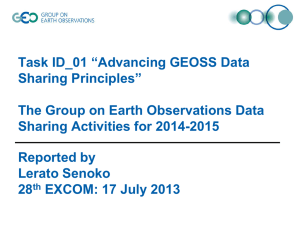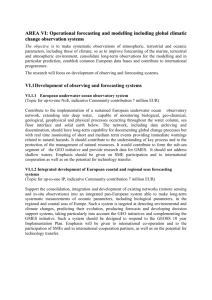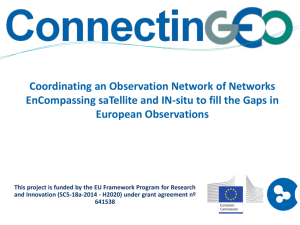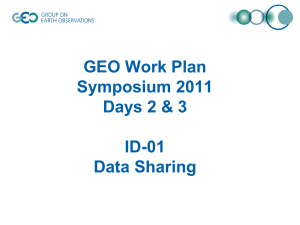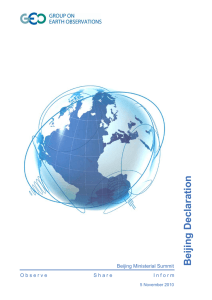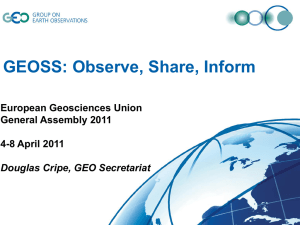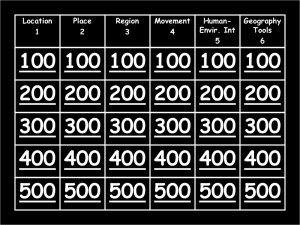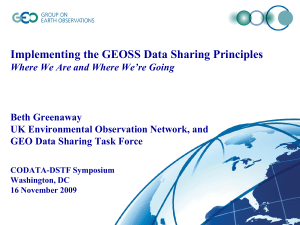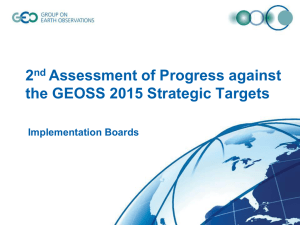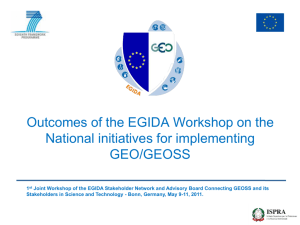Keynote speech - Group on Earth Observations
advertisement
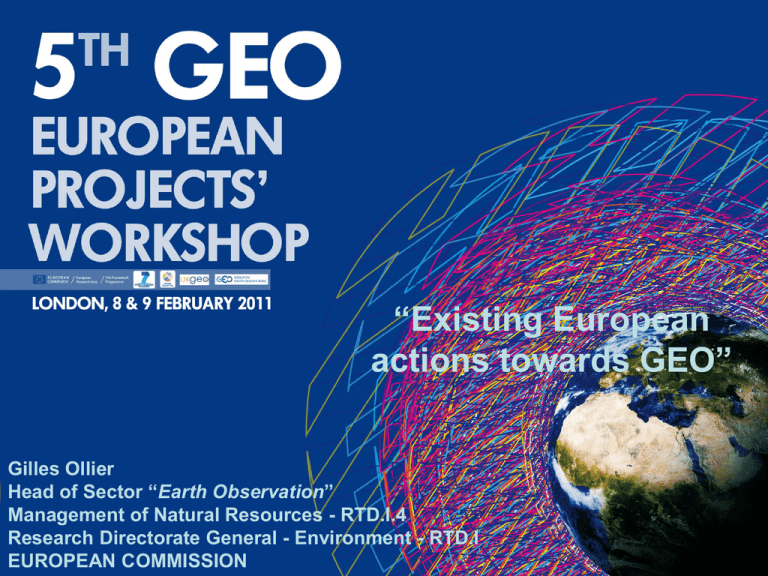
“Existing European actions towards GEO” Gilles Ollier Head of Sector “Earth Observation” Management of Natural Resources - RTD.I.4 Research Directorate General - Environment - RTD.I EUROPEAN COMMISSION The access to global sets of Earth observation data and resources is a necessity in many domains: climate prediction (e.g. Carbon Cycle), management of ocean resources, health protection etc… : •Access to new data •Data cohesion (calibration and interoperability) •Agreed global data set in strategic areas GEO is a unique platform to promote international collaboration in many areas (space, research, development etc….): •Collaboration with Research partners outside Europe: China, Africa, US •Optimise and share space infrastructure •Support Capacity Building in developing countries Global EO data sets are essential for the implementation of a number of European Union policies including environment, development, innovation, research and finally, space policy. European Participating Organisations ECMWF, EUMETSAT, ESA, EEA, etc…. well committed to the GEO tasks, provision of space and in-situ infrastructures and Earth Observation services. European Countries National institutions from most MS are committed in GEO tasks, contributing at the integration of national systems and research in the global context. E.g. •Norway NSC co-leads Forest Carbon Tracking Task; •The Netherland ITC leads of several Capacity Building sub-tasks; •Italy (CNR) co-leads HE and EC tasks •Germany (DLR)co- leads EN task; •UK: One Geology, GEO Data Sharing TF, GEOSS Data CORE, Co-Chair S&T Committee etc.. European Commission Research components for GEOSS through ENV FP7 theme (emphasis on societal benefits and in-situ observations), SPACE FP7 theme (GMES remote-sensing and operational aspects) Standards and Interoperability component through the INSPIRE Directive and the JRC Capacities; 4 097 People; 4 750 JRC (EC); 1 751 € million Ideas; 7 510 Cooperation, 32 413 2007 call: Coverage of several GEO Societal Benefits Areas by involving the European S&T Community (Carbon Cycle, Biodiversity, Ocean Interior, Soil, Water) 2008 call: Research supporting the Initial GEOSS Information System in relation with Europe’s development of INSPIRE 2009 call: Emerging observing systems (Environment and Health, Sustainable exploitation of mineral resources) / Further structuring the European approach in GEO 2010 call: New tasks introduced in the 2009-2011 GEO Work Plan (Global Mercury Observing System, promoting GEO in S&T Community) links between GEO and new technologies (data visualisation, GNSS, reanalysis) 2011 call: Strong emphasis on Capacity Building (EO for agri and forestry in Africa, Monitoring of Med African costal zone) , Data sharing (GOOS, atmospheric hazards, water management) Global Observation systems (Carbon) Köppen climate zones WWF ecoregions EBONE – European Biodiversity Observation Network After the recent conference of the UNCBD in Nagoya it was decided that GEO should contribute to Coordinate the global biodiversity observation effort (GEO BON) • • • • • Enhance the capacity to plan and build multidisciplinary scenarios Integrate socio-economic development indicators Improve governance for managing non-renewable natural resources Market investment opportunities to support the economy Strengthen professional skills and capacities EO2HEAVEN: Earth Observation and Environmental modelling for the mitigation of Health risks “Health and development policies” EO2HEAVEN will develop a better understanding of the complex relationships between environmental factors, population exposure, and health impacts GMOS: Global Observation System for Mercury “Environment and Health policies” GEO Task He-09-02d “Global Observation System for Mercury” EU Thematic Strategy on air pollution, Marine conventions GMES, etc. GMOS Oceanographic Program GMOS Ground-Based Observation System GMOS Aircraft-Based Program FP7 Capacity Program: support to Research Infrastructures EUFAR ICOS EMSO LIFEWATCH FP7 SPACE THEME GMES 1) Added-value services to policy-makers and to other users on an operational sustained basis. •Land Monitoring (GEOLAND2): Initially European land cover & urban spots •Marine Monitoring (MyOcean): Sea state & ecosystem characteristics over Global ocean & European regional seas •Atmospheric Monitoring (MACC): Atmospheric composition for air quality (European) and climate forcing (global), ozone monitoring (global) and solar energies 2) Space Infrastructure components: Sentinel missions (ESA), Eumetsat, parties National & 3rd GMES project resources and data are now registered in GEOSS and Sentinels will follow GEOSS data sharing principle Cloud Properties Carbon Dioxide, Methane & other GHGs Ozone Aerosol properties Sea Surface Temperature Sea Level Sea Ice Ocean Colour Glaciers and ice caps Land cover Fire disturbance Esa initiative: Essential Climate Variables Potential to use novel technologies to deliver novel Earth Observation (EO) tools and applications in support of (GEOSS): Inovation Union initiative This appoach will be central for the implementation of projects in the years 201213, building on cutting-edge technologies in the information, telecommunication, and space sectors: •Achieving the development of the unique interoperable GEOSS Information System and implementing the GEOSS Data Sharing Action Plan through, for instance, the use of Grid and Cloud Computing technologies; •Developing the global integrated network of in-situ environmental observations, taking particular advantage of mobile telephony; •Providing global environmental assessments based on the new generation of European Earth Observation satellites (SMOS, CRYOSAT, GOCE). Conclusions Continue to connect the rich European EO component to GEOSS: Significant resource dedicated to EO in Europe (GMES, GALILEO, INSPIRE, Development policies, Research activities) Take advantage of the Innovation Union Strategy: Include a research agenda focused on challenges: energy security, transport, climate change and resource efficiency, health and ageing, environmentally friendly production methods and land management, and to enhance joint programming with Member States and regions Acknowledge GEOSS benefit greatly from involvement of Science Community: Observation Systems specialized or covering several societal benefit areas are often prototypes or scientific observatories A GEOSS common infrastructure (GCI) enabling GEOSS resources to be readily discovered and accessed (requiring up-to-date information science) Sophisticated modelling capacity to deliver products for users Thank you!
